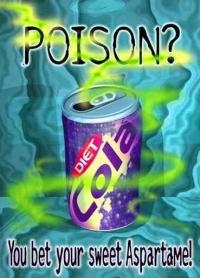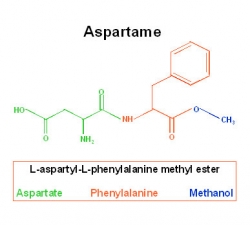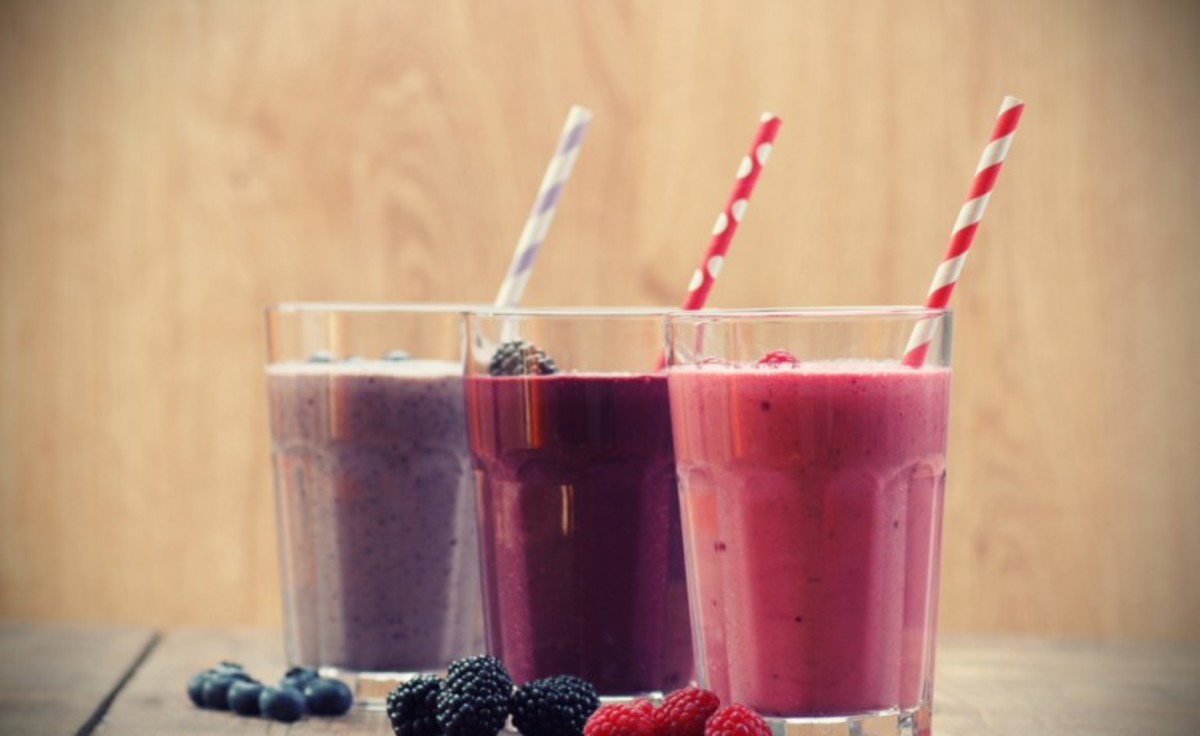Can Aspartame Kill You?

Is Your Diet Soda Bringing Your Body Harm?
Wow! Wow! Wow! It absolutely cannot be true! There's just no way because, if Aspartame was a toxin to our bodies, it wouldn't be used in food products at all - even in the smallest quantities - right? Well, let's take a few moments to explore this issue further.
Apparently, Aspartame is a money maker, similar to the lottery, tobacco, and alcohol industries. Many people want to lose weight, or not grow any heavier/bigger, and they are desperate to find solutions; Aspartame seems to be the easiest one. As a result, the diet industry is worth trillions of dollars to corporations who want to continue to realize their profits.
We must also realize that many people in today's society like to live in excess - they've largely forgotten what it's like to consume, and do, things in moderation. Some people will gamble and drink their days away, though most people won't. Others will eat at fast food joints every day because it's easier and faster than cooking a meal at home.
On another note, some people think nothing of eating six eggs per day (a healthy food) and too many don't see a problem with consuming six cans of soda a day (an unhealthy product.) However, it doesn't mean either of these situations are healthy if continued for an extended period of time.
Would you like to learn more about the beverages you may be drinking and the products you may be eating every day which may be slowly killing you? If so, read on and let's take this journey of discovery together.
Since you're reading this, it means you are ready to open your mind to the possible truth about Aspartame.
I assure you that I'm learning about this as I go along - so you will surely witness my shock as well as experience your own in some cases.
A dear friend of mine sent me a line in an e-mail, stating that Aspartame was a poison. My curiosity was piqued enough to check it out...
But first...
Do you drink diet soda on a regular basis?
For now, let's go on the presumption that it's the excessive amount of Aspartame that has the ability to cause poisoning. We can always change our minds later if we feel the need to.

The Structure of Aspartame
There are two isolated amino acids in Aspartame: Aspartic Acid (Aspartate) makes up about 40% of the structure. Phenylalanine makes up 50% and the remaining 10% is made up of Methanol.
Let's take a look at the effects of the isolated components of Aspartame.
Aspartic Acid - aka Aspartate
Under excessive conditions, Aspartate can cause hormonal disorders and problems with eyesight. It affects the central nervous system and stimulates Hyperactivity. As such, pregnant women and people who suffer from ADD/ADHD should avoid consuming foods and beverages which contain Aspartame.
However, some of the other adverse reactions to Aspartate are:
- headaches/migraines
- nausea
- abdominal pain
- fatigue
- sleep disorders
- anxiety attacks
- depression
- asthma/chest tightness.
Phenylalanine
Did you know that excessive amounts of Phenylalanine appears to be linked to Cancer? Cancer cannot survive without this amino acid and Aspartame has plenty of it - 50% of its molecular structure.
Does this mean that if you drink a diet soda every week that it will result in you being diagnosed with Cancer, at some point? No. However, if you drink 3 cans of diet soda per day for a number of years, who knows what may happen?
On another note, Phenylalanine is one of the amino acids found, as part of a combination, in foods such as eggs, milk, bananas and meat. However, as with any good thing, an excess can cause problems.
Too much Phenylalanine has been known to cause:
- seizures
- elevated blood plasma (clear fluid found in the blood)
- during pregnancy, it can cause retardation
- insomnia
- PMS (Phenylalanine blocks the release of Serotonin - a neurotransmitter which helps alleviate depression)
- severe mood swings
- menstrual problems
- dizziness
- Fibromyalgia symptoms
- symptoms of Multiple Sclerosis (MS)
Methanol
Methanol, also known as Methyl Alcohol, is a colorless, poisonous liquid used as a solvent (a liquid with the power of dissolving) and fuel.
Fuel? Is it found in products we may be consuming on a regular basis without knowing? Apparently so.
However, the dangerous thing about Methanol is that, when released at 86 degrees Fahrenheit, it becomes an uncontrollable poison which creates a lot of damage.
Methanol, in an uncontrolled environment:
- breaks down into Formic Acid and Formaldehyde (embalming fluid)
- poisons nerves
- is a known carcinogen (Cancer-causing agent)
- causes retinal damage in the eye
- interferes with DNA replication
- causes birth defects.
Controversy
There is much controversy surrounding this subject; you will even find it in the sources I've listed.
However, the fact remains that approximately 200 million people worldwide consume Aspartame.
Another fact: if you wish to play it safe and avoid consuming Aspartame, read the nutrition labels on food products to see if it is listed as an ingredient. Good luck in avoiding it in diet or low fat/no sugar added products however, because it is a common ingredient in many household foods.
What's your reaction?
I'm interested in learning about the reactions of people who have consumed regular quantities of Aspartame - whether adding artificial sweeteners to a cup of coffee or bowl of cereal - or in the form of diet sodas.
After reading this article, what's your reaction?

Sorry, Chef Squid
I know you love cooking and baking but you should stay away from using Aspartame. When you make your cookies and muffins, use regular or brown sugar. Apparently, it is not advisable to use artificial sweeteners when baking; the internal temperature will break down the Aspartame - which means that Methanol is already produced before you take your first bite.
The general public may not be aware of this but I thought I'd let you know. Feel free to investigate the matter further, if you so desire.
Photo courtesy of Steve Thompson at Squid Art Too.
An accusation
People have accused industries of being concerned more about lining their pockets than about the health of people. It's a huge claim and, in a capitalist society, the goal is to make money and to continue making it, irrespective of the nature of the industry.
However, consumers have to remember that they choose where to spend their money and what they choose to spend their money on - so, ultimately if they make the wrong choices, they can only blame themselves. Also, if they fail to educate themselves, they can also only place the blame at their own feet.
1981 - then 1983
After careful consideration, in 1981, the Food and Drug Administration (FDA) approved the use of Aspartame in several foods. In 1983, it went on to permit the use of Aspartame in carbonated beverages and carbonated beverage syrups.
These are some of the foods Aspartame is now found in:
- cold breakfast cereals
- chewing gum
- dry drink mixes, juice blends and juice drinks
- instant tea, coffee and cocoa mix
- gelatin and confections
- puddings, fillings, dessert mixes and mousse
- yogurts - sugar-free, fat-free, and drinkable
- non-dairy toppings, ice cream toppings, ice creams (no sugar added/sugar-free)
- tabletop sweeteners
- carbonated beverages and carbonated beverage syrups
- frozen desserts
- some vitamins
- sugar-free cough drops, breath mints, hard candies and soft candy chews
- flavored water products and vegetable drinks
- flavored syrups for coffee
- frozen ice and frozen ice cream novelties
- fruit spreads, jams and jellies
- Iced Tea, powder and ready to drink
- maple syrups
- meal replacements
- non-carbonated diet soft drinks and powdered soft drinks
- nutritional bars
- protein nutritional drinks
- anything which states "no sugar added" or "sugar-free"
What is considered a safe level of Aspartame on a daily basis?
Who makes this decision?
The World Health Organization (WHO) and the Food and Agriculture Organization (FAO) have a Joint Expert Committee on Food Additives (JECFA.) These organizations fall under the jurisdiction of the United Nations, and JECFA is responsible for determining safety level guidelines of many food additives. However, in the United States, this is the responsibility of the FDA.
To be clear, the Acceptable Daily Intake (ADI) is the amount of an additive - such as Aspartame - that can be eaten every day for the remainder of a person's life and still be considered harmless.
Apparently, rats in the 1970s could safely consume 4 grams of Aspartame per kilogram of body weight without suffering adverse effects. This amount was then divided by 100 to be sure to determine safe levels for humans, which set it at 40 milligrams of Aspartame per kilogram of body weight. According to the FDA, the current acceptable daily intake of Aspartame (for humans) is 50 milligrams per kilogram of body weight.
Let's put this in perspective...
According to the FDA, if you weigh 70 kilograms - approximately 150 pounds - you can safely consume 3500 milligrams of Aspartame every day for the remainder of your life (providing you don't lose an excessive amount of weight and are not sensitive to Aspartame) without suffering any ill effects.
To break it down even further, a person weighing 70 kilograms can safely drink 19 cans of diet soda per day. A 30 kilogram person would have to drink more than 8 cans per day to suffer ill effects - because a can of diet soda is comprised of only 180 milligrams of Aspartame.
A Mystery
The average person will not consume such great quantities of diet soda, especially ranging in the numbers from 8 cans, or more, per day. Thus, if diet soda was the only factor involved, people may be safe enough when consuming Aspartame.
However, there are other foods which contain Aspartame - and its components of Aspartic Acid, Phenylalanine and Methanol. Foods such as milk, meats, fruits, vegetables and dried beans are among them, not to mention all the foods listed previously on this page.
Considering there is approximately 6,000 food products which contain Aspartame - from natural foods to yogurts and desserts ...
Do you think it's a reasonable possibility that people may be consuming more Aspartame than is safe for them?





